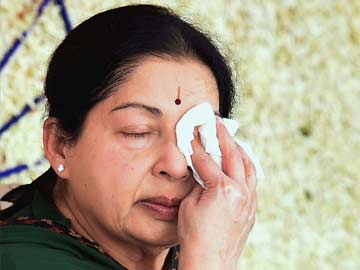
Karnataka High Court judge Justice A V Chandrashekhar dismissed the bail plea of former Tamil Nadu chief minister J. Jayalalithaa and three of her associates by stating that the the Supreme Court too had in recent times taken a strong stand against corruption cases, calling "corruption a violation of human rights".
"In view of clear observation of the apex court that corruption is a violation of human rights this is not a fit case for suspension and bail. Bail plea is liable to be dismissed," the court observed.
Tuesday's court ruling ensures that the AIADMK supremo will be lodged in Bangalore prison. The former chief minister of Tamil Nadu has already spent ten days in jail, where she was lodged immediately after her conviction on 27 September.
The verdict has angered her followers across Bangalore and Tamil Nadu. Security was tightened in Bangalore and across Tamil Nadu and prohibitory orders under Section 144 were imposed around the court premises in Bangalore to prevent any untoward incidents.
Supporters of AIADMK had put up "welcome' signs across Tamil Nadu in anticipation of Jayalalithaa's bail.
Ahead of the hearing, posters with purported threats to kidnap natives of Karnataka staying in Chennai were spotted in the Tamil Nadu capital. The posters, reportedly from local AIADMK leader KC Vijay, threatened to hold Kannadigas captive until Jayalalithaa is granted bail, Hindustan Times reported.
Jayalalithaa was sentenced to four years in jail and imposed a fine of ₹100 crore on 27 September in a case involving disproportionate assets to the tune of ₹ 66.65 crore. Following the conviction, she was shifted to Bangalore's Parappana Agrahara Central Prison.
Her lawyer Ram Jethmalani had filed two petitions after she was sent to jail: One seeking bail, the other challenging the conviction. The first hearing was postponed to 6 October as the prosecution lawyer did not receive any official notification from Karnataka government.
However, Jethmalani approached the Chief Justice of Karnataka DH Waghela seeking early hearing as diabetic Jayalalithaa had been facing health troubles in the jail. Waghela posted the hearing for 1 October, which was later adjourned by the special vacation Bench to 7 October.
The delay in Jayalalithaa's bail plea hearing resulted in chaos among people of Tamil Nadu, including the lawyers, who blamed Karnataka High Court for conspiring against AIADMK supremo and delaying the hearing deliberately.
Jayalalithaa was convicted in the 18-year-old disproportionate assets case by a special court on 27 September, and was sentenced for accumulating assets worth ₹66 crore during her first time in office between 1991 and 1996. She was convicted under Prevention of Corruption Act and had to immediately step down as the chief minister.
For a Live coverage of the court proccedings, click here.
Jayalalithaa's bail petition, along with those of her aide Sasikala and the latter's relatives VN Sudhakaran and Elavarasi, was heard by Justice AV Chandrashekara, the regular Bench that deals with bail petitions and criminal appeals under the Prevention of Corruption Act.
While Jayalalithaa's lawyer Ram Jethmalani sought bail on the grounds of her deteriorating health, special public prosecutor G. Bhavani Singh argued that Jayalalithaa could influence proceedings if granted bail, or could abscond from the country.
Jethmalani countered that Jayalaithaa was a "law-abiding citizen" and would not abscond.
Jayalalithaa has also filed a petition challenging the sentencing in the case, claiming that the charges against her of amassing wealth were false.
Several people in Tamil Nadu had committed suicide and many died from shock from Jayalalithaa's conviction.

















